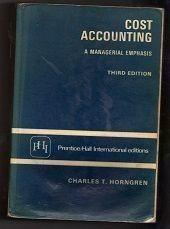Question
Unter Components manufactures low-cost navigation systems for installation in ride-sharing cars. It sells these systems to various car services that can customize them for their
Unter Components manufactures low-cost navigation systems for installation in ride-sharing cars. It sells these systems to various car services that can customize them for their locale and business model. It manufactures two systems, the Star100 and the Star150, which differ in terms of capabilities. The following information is available.
| Costs per Unit | Star100 | Star150 | |||||
| Direct materials | $ | 63 | $ | 73 | |||
| Direct labor | 30 | 40 | |||||
| Variable overhead | 15 | 20 | |||||
| Fixed overhead | 88 | 118 | |||||
| Total cost per unit | $ | 196 | $ | 251 | |||
| Price | $ | 290 | $ | 390 | |||
| Units sold | 4,000 | 2,000 | |||||
The average wage rate is $20 per hour. Variable overhead varies with the quantity of direct labor-hours. The plant has a capacity of 20,000 direct labor-hours, but current production uses only 10,000 direct labor-hours.
Required:
a. A nationwide car-sharing service has offered to buy 2,500 Star100 systems and 2,500 Star150 systems if the price is lowered to $200 and $250, respectively, per unit.
a-1. If Unter accepts the offer, how many direct labor-hours will be required to produce the additional systems?
a-2. Complete the following table to determine the differential profit increase (or decrease) if Unter accepts this proposal. Prices on regular sales will remain the same.
b-1. Suppose that the car-sharing has offered instead to buy 3,500 each of the two models at $200 and $250, respectively. This customer will purchase the 3,500 units of each model only in an all-or-nothing deal. That is, Unter must provide all 3,500 units of each model or none. Unter's management has decided to fill the entire special order for both models. In view of its capacity constraints, Unter will reduce sales to regular customers as needed to fill the special order. Complete the table below to determine the total contribution margin with the special order added.
b-2. How much will the profits change if the order is accepted? Assume that the company cannot increase its production capacity to meet the extra demand.
c-1. Assume that, in the situation presented in requirement b-1, the plant can work overtime. Direct labor costs for the overtime production increased to $30.00 per hour. Variable overhead costs for overtime production are $5 per hour more than for normal production. Complete the table below to determine the total contribution margin.
c-2. How much will the profits change in this situation?






Step by Step Solution
There are 3 Steps involved in it
Step: 1

Get Instant Access to Expert-Tailored Solutions
See step-by-step solutions with expert insights and AI powered tools for academic success
Step: 2

Step: 3

Ace Your Homework with AI
Get the answers you need in no time with our AI-driven, step-by-step assistance
Get Started


